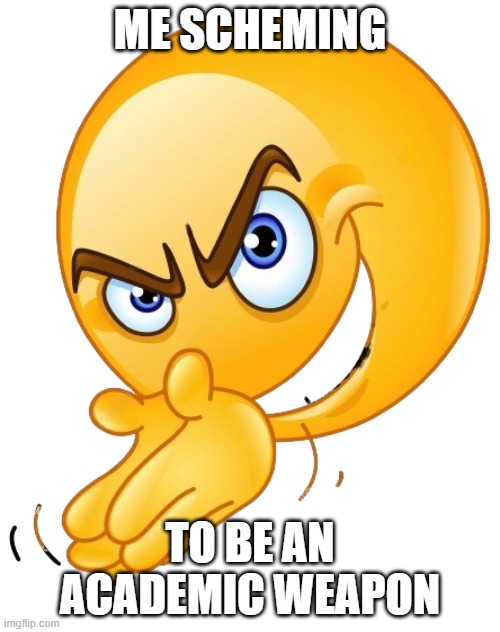I am proud to say that I am an intellectual criminal. I will steal ideas and shape them into new perspectives. I kill off misconceptions and stereotypes about a subject with research and analysis. I cause the good kind of headaches, ones that will challenge you to think deeply and keep the conversation flowing. If I am going to be in school for most of the essential years of my life, I might as well make it fun.
In grade school, I crafted worlds of critical thought, intrigue and fantasy out of vague writing prompts. I tried on different interpretations of historical events like they were fashion. I experimented with every “What if…?” in my head during science classes and delighted in the results, even if my hypothesis was completely wrong.
When I came to college, I was an unstoppable force of rebellion. Classes were my learning experiments. I wrote a research paper about strippers as a discourse community, made a “Ted Talk” about living confidently (appropriately titled “I Don’t Give a Fuck”), analyzed and developed terms and characteristics for different types cyberbullying on Twitter (now X, but I’m not budging) and much more. I like to consider myself an academic with a little bit of swag.
There is an unmistakable power in writing. It challenges your worldview and empowers you to think creatively and critically. It is a way of confidently showing the world that you have a unique voice that dares to stand on paper. Despite the potential, a lot of people view writing with tired eyes and indifferent attitudes. To them, writing is just a function that gets them through daily tasks. With ChatGPT and other A.I. engines, writing can be streamlined and generalized. What could possibly make it worthwhile, other than for its basic need? Such thinking is an affront to being human.
If you want to have the same zeal as me (or you just want to make writing your weekly blog post bearable), you need to be a troublemaker.
Stop Generalizing Yourself (and Your Writing)
Writing and the human experience are interlinked. Our actions are extensions of the intellectual processes that are happening within us. Remember when someone asked you, “How would you describe yourself in three words?” You paused, furrowed your brows and had to go through at least over a decade of character development to put into common categorical traits. After processing your entire existence in less than two minutes, you spout some answers: “smart”, “funny”, “kind”. Even then, your response felt incomplete, but you had to get that question out of the way. No matter how much you try, you cannot generalize yourself. Since writing is an extension of yourself, the same sentiment applies there.
Distinguished Miami University English scholar and author Elizabeth Wardle harbors a similar sentiment to mine; it is impossible to generalize writing. Writing is as nuanced and specific as the individual. What and how you write is influenced by various factors, such as audience and purpose.
Over time, writing for different contexts helps one develop different strategies, skills and more to help them evolve. There is no such thing as the ‘perfect’ standard for every writing task that you encounter. Sure, the classic five-paragraph model offers a solid start for the fifth-grader that is unsure about how to approach their upcoming history essay. However, as they continue their writing journey, they will be startled by the realization that the five-paragraph cookie-cutter model is not suitable for certain writing contexts. At first, they will panic. Over time, they will carry a resentment of writing, fueled by a system that does not encourage evolution in writing. This is often where the adult sentiment of “English was my hardest/worst subject in school” stems from. If you resent your writing ability, you resent this extension of yourself that is unique and purposeful. It soon becomes easy to see writing as a dull chore.
Becoming a Criminal
Relax, I’m not telling you to commit a felony. I want you to become an academic weapon, to think critically enough to unlock areas of thought that will shock your, or someone else’s, current perspective. If you dare to be this dangerous, Westfield State University writing professor Dr. Catherine Savini encourages you to think critically about whatever writing task you come across with her four-step process.
Savini’s method is a strategy that helps you maneuver through any writing task. First, note any interesting quirks about the task at hand, such as confusing vocabulary or critical phrases. Next, use what you find to find a problem that needs a solution. For many people, this can be the most difficult part, and it is not just because it involves plenty of thinking. According to The Eberly Center for Teaching Excellence and Educational Innovation at Carnegie Mellon University, these writers tend to lack confidence in their abilities. One way of building this confidence is to find personal experiences that are relatable to the task or any related readings, to make the subject matter seem less daunting. Reviewing other texts that contradict your opinions is another confidence-booster, because it keeps you well-informed about other opinions. After finding a problem (or five), pose at least one question that the problem(s) create for you. Finally, discover if that question is worth pursuing. Why is this important to your and your problem?
Keep in mind that this is just one of the myriad of strategies that help writers guide their writing. Again, writing is tailored to you. Soon, you will discover your own writing methods and processes that rival Savini and Wardle’s insight. Whether you are a full-time college student or published poet, today is a great day to cause headache-inducing scholarly mischief.
Now, go raise hell.





Leave a Reply